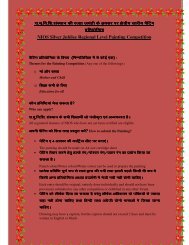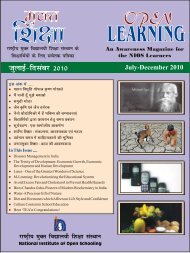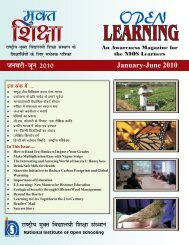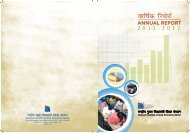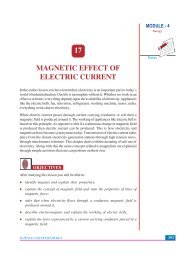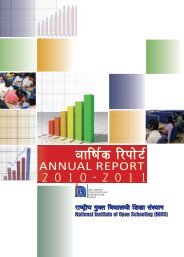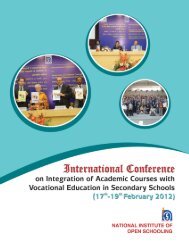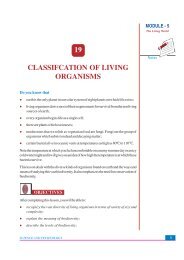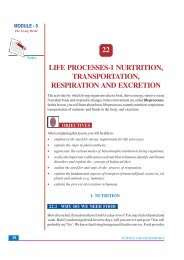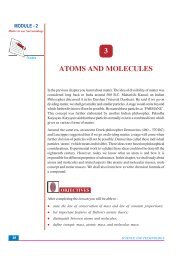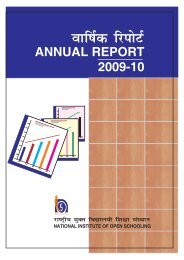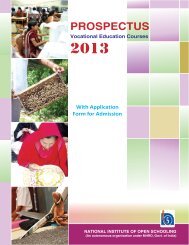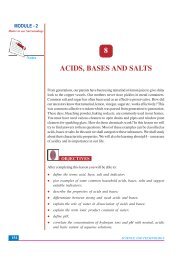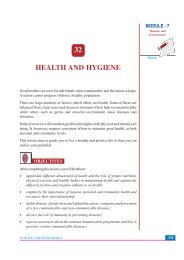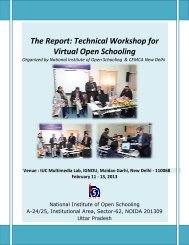NIOS : The Way Forward - The National Institute of Open Schooling
NIOS : The Way Forward - The National Institute of Open Schooling
NIOS : The Way Forward - The National Institute of Open Schooling
You also want an ePaper? Increase the reach of your titles
YUMPU automatically turns print PDFs into web optimized ePapers that Google loves.
<strong>NIOS</strong>: <strong>The</strong> <strong>Way</strong> <strong>Forward</strong> / 3<br />
and others who work with their hands. <strong>The</strong> former are created superior and to<br />
rule while the others are to remain subject and be ruled. For good measure, a<br />
divine sanction was also attributed to this socially engineered caste hierarchy<br />
so that the so-called upper and lower spectrums <strong>of</strong> society internalized it as<br />
the will and design <strong>of</strong> God. However, in the last three or four decades <strong>of</strong><br />
modern Indian history, this socially ascribed status, this cultural myth, is being<br />
challenged and the sharp borders <strong>of</strong> this humanly engineered system are<br />
beginning to get broken down, though still at a slow pace.<br />
In the knowledge society that is emerging today, knowledge is the gateway to<br />
quality <strong>of</strong> life. Access to and availing <strong>of</strong> knowledge and acquiring competences<br />
for life and living are non-negotiable constituents for national regeneration<br />
and to build a New India according to the integral vision <strong>of</strong> our Constitution.<br />
Hence, with the rest <strong>of</strong> the world and following the UN’s mandate, India is<br />
pursuing the goal <strong>of</strong> universalization <strong>of</strong> education. For achieving this difficult<br />
goal, it must develop systems and strategies to reach the hitherto unreached.<br />
In India, we identified the following national vision and goals:<br />
<strong>The</strong> Report <strong>of</strong> the <strong>National</strong> Commission on Teacher Education (1983) and<br />
<strong>National</strong> Review Committee Report (1991) <strong>of</strong> the <strong>National</strong> Policy on Education<br />
<strong>of</strong> 1986 (“Towards an Enlightened and Humane Society”) identified the<br />
following <strong>National</strong> Goals:<br />
●<br />
●<br />
●<br />
●<br />
●<br />
A United and Secular India<br />
A Modern Nation<br />
A Productive People<br />
A Humane and Caring Society<br />
An Enlightened and Proactive Citizen<br />
<strong>The</strong> India that is envisioned is the India <strong>of</strong> the Constitution.<br />
1.1.3 <strong>The</strong> Education Context<br />
In the current context, good quality education is an essential resource for life<br />
and living. <strong>The</strong> presence or absence <strong>of</strong> this resource is the basic divider <strong>of</strong><br />
our Indian society today. India had the distinction <strong>of</strong> its ancient insight that it is<br />
knowledge that liberates us. (gyana marga mukti marga) but knowledge had<br />
remained the prerogative <strong>of</strong> a few in our Indian society. <strong>The</strong> unavailability <strong>of</strong><br />
this essential resource, namely a good quality education, continues to deprive<br />
the poor <strong>of</strong> availing <strong>of</strong> the many benefits <strong>of</strong> life and living even today. As a<br />
consequence, a significant third <strong>of</strong> the population is sidelined and marginalized,<br />
while there is such an over-abundance <strong>of</strong> both knowledge and technology<br />
with the few rich and the powerful.



